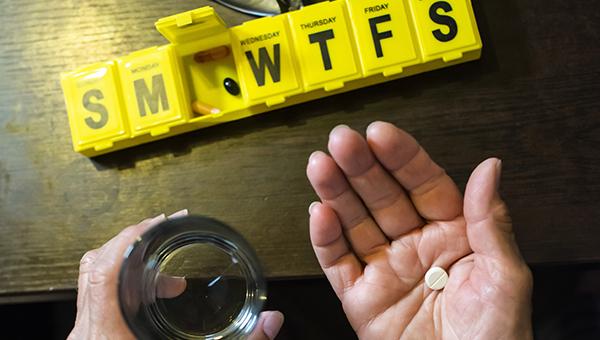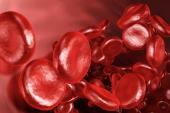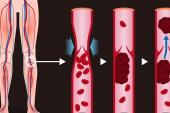DOACs Should Be Standard to Prevent VTE Recurrence in Cancer: Meta-analysis
In an AI-based review of “living” data, DOACs slashed repeat thromboembolism rates by 41% without impacting bleeding risk.

Cancer patients are 40% less likely to experience recurrent acute venous thromboembolism (VTE) when treated with direct oral anticoagulants (DOACs) rather than low-molecular-weight heparin (LMWH), according to a unique systematic review and meta-analysis.
The researchers, led by Irbaz Bin Riaz, MD (Mayo Clinic, Rochester, MN), say DOACs should be considered standard of care in cancer-associated thrombosis, except in those with a high risk of bleeding. Published online January 18, 2022, in Mayo Clinic Proceedings, the analysis adds to data from several prior trials supporting DOAC use in this patient population, including the recently published Caravaggio trial, which found apixaban (Eliquis; Bristol-Myers Squibb) to be noninferior to LMWH for preventing recurrence of VTE without increasing bleeding.
“Until further data become available, it is probably safe to consider DOAC therapy for these patients,” Riaz and colleagues write. For those with cancer, thrombosis as a driver of death is second only to cancer progression, they add.
Their meta-analysis, which employs artificial intelligence (AI) technology, is designed to continue updating as new results arrive.
Sahil Parikh, MD (NewYork-Presbyterian/Columbia University Irving Medical Center, New York, NY), who was not involved in the study, said its findings add to emerging knowledge on the safety and efficacy of DOACs in cancer-associated VTE as an option over traditional heparin.
“The principle advantage is that patients anticoagulate very quickly after their first oral dose of a DOAC. Secondly, the maintenance is easier because you don't need injections. Thirdly, it seems that it's actually more effective,” Parikh said. “In this population, where you're trying to streamline their medication regimens to the extent that you can, this is a nice addition to the armamentarium.”
Better Efficacy Without Bleeding Trade-offs
For the analysis, Riaz and colleagues examined data from 2,894 patients with either active cancer or a history of cancer who were enrolled in four RCTs (Caravaggio, ADAM VTE, SELECT D, and Hokusai VTE). More than one-third of patients had deep vein thrombosis (DVT) as the qualifying thrombus, more than 90% had solid tumors—the most common being colorectal—and 61% had locally advanced or metastatic disease.
In the trials, dalteparin (200 IU/kg daily for a month followed by 150 IU/kg daily thereafter) was compared with edoxaban (Savaysa; Daiichi Sankyo; 60 mg once daily), rivaroxaban (Xarelto; Bayer/Janssen; 15 mg twice daily for 3 weeks followed by 20 mg once daily), and apixaban (10 mg twice daily for a week followed by 5 mg twice daily). Follow-up ranged from 6 to 12 months.
Overall, there were 82 recurrent VTE events (5.6%) in the DOAC arm versus 132 (9.1%) in the dalteparin arm (OR 0.59; 95% CI 0.41-0.86), with major bleeding event rates of 4.8% versus 3.6%, respectively (OR 1.34; 95% CI 0.83-2.18). However, DOACs were associated with more clinically relevant nonmajor bleeding events compared with dalteparin (11.2% vs 7.3%; OR 1.69; 95% CI 1.13-2.42). In terms of mortality, there were no statistically significant differences between DOACs as a class and dalteparin, or between any individual DOACs.
The network meta-analysis showed that individually, rivaroxaban decreased VTE recurrence compared with dalteparin (OR 0.41; 95% CI 0.16-0.95), as did apixaban (OR 0.58; 95% CI 0.37-0.90). Further, apixaban was associated with fewer combined VTE recurrences and major bleeding events compared with dalteparin, and was not significantly different in that regard from edoxaban or rivaroxaban.
To TCTMD, Parikh said the trends toward more bleeding are to be expected with DOACs. “Generally in any anticoagulant study, if there's more effect in reducing clot, you should also see more bleeding because it means that the drug is more powerful,” he said.
Emerging Role for ‘Living’ Data
As the authors note, data supporting DOACs over LMWH in the treatment cancer-associated thrombosis have emerged rapidly in recent years, making it difficult and laborious to refresh outdated systematic reviews and meta-analyses, as was necessary after the Caravaggio trial was published. A unique aspect of the new analysis is the use of AI—via the LIvE synthesis framework—to create a living interactive review of RCTs that will be updated as more data become available.
Riaz and colleagues say the living review will continue to search out data updates of additional trials of DOACs versus warfarin in cancer-associated thrombosis, including CANVAS, CASTA-DIVA, PRIORITY, and CONKO-011.
“You have it continuously search the literature and when you find a new study, you figure out if it applies. Then, with some coaching from a human who's an expert in the field, one can make meaningful and rapid updates on data sets that would otherwise lay fallow for a while until somebody does a new analysis,” Parikh said. “This kind of approach can be extremely time saving and therefore allows us to more quickly get so-called ‘big data’ translated into clinical practice.”
The updated data will be needed to inform forthcoming guidelines on the treatment of cancer-associated thrombosis.
“The guidelines probably need to transition somehow to a ‘live’ paradigm as well,” Parikh added. “What I expect we will see is a careful, but steady, transition from low-molecular weight heparin to DOACs in the guidelines, especially now that there's an antidote and the reversibility question is less of an issue.”
L.A. McKeown is a Senior Medical Journalist for TCTMD, the Section Editor of CV Team Forum, and Senior Medical…
Read Full BioSources
Riaz IB, Fuentes HE, Naqvi SAA, et al. Direct oral anticoagulants compared with dalteparin for treatment of cancer-associated thrombosis: a living, interactive systematic review and network meta-analysis. Mayo Clin Proc. 2022;Epub ahead of print.
Disclosures
- Riaz reports no relevant conflicts of interest.
- Parikh reports funding to his institution from Shockwave Medical, TriReme Medical, Surmodics, Abbott, Boston Scientific, Veryan Medical, and Medino; serving on the advisory boards of Abbott, Janssen, Medtronic, Boston Scientific, CSI, Philips, and Cordis; and consulting for Terumo, Abiomed, Penumbra, and Inari.




Comments